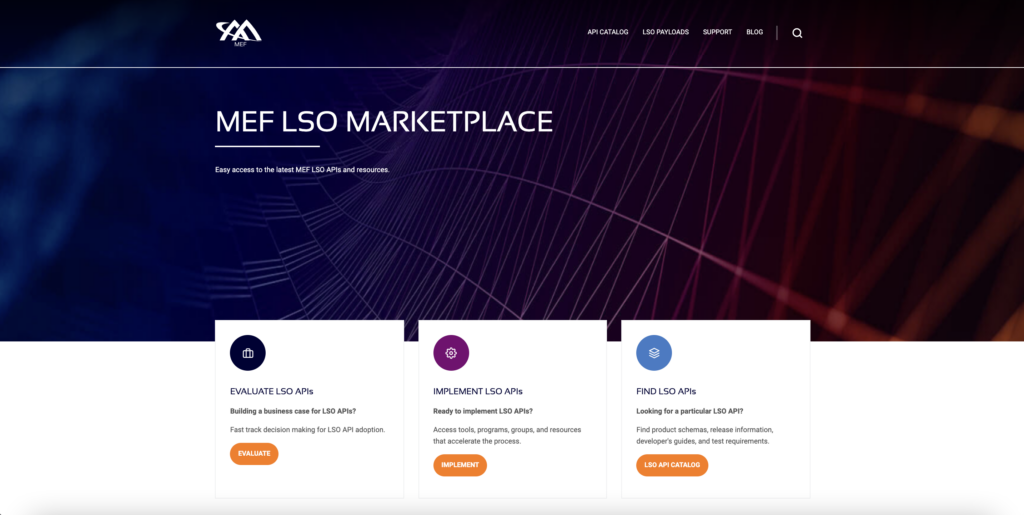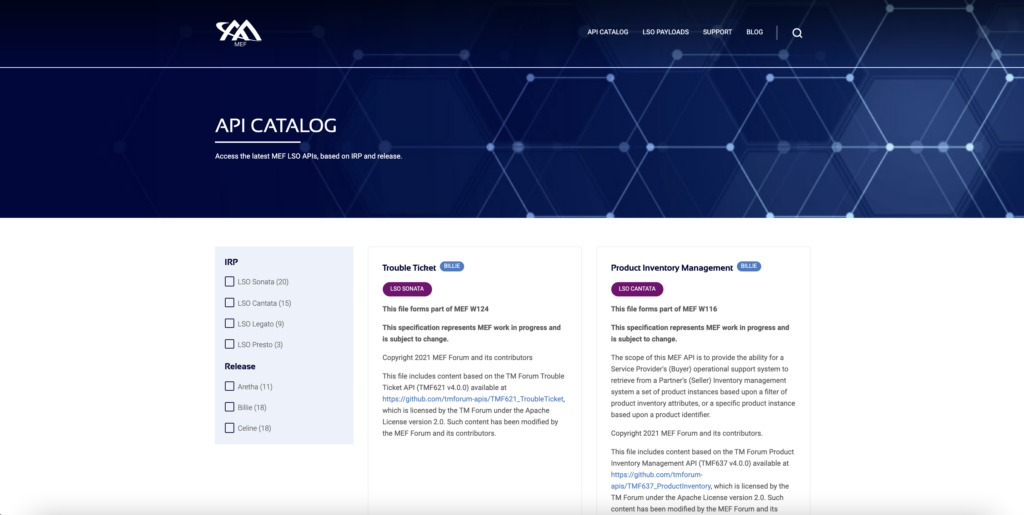
on Posted on Reading Time: 4 minutes
MEF has launched the LSO Marketplace at lso.mef.net-a microsite dedicated to help decision makers build a business case for implementing LSO APIs and to assist IT architects and developers tasked with enabling open, standardized business automation with partners and customers.

The LSO Marketplace provides a one-stop-shop for business/product decision makers, IT developers and architects, as well as DevOps teams. It is designed to accelerate the evaluation and implementation of MEF Lifecycle Service Orchestration (LSO) APIs for automating service provider and enterprise commercial transactions.
Its major elements include:
Comprehensive LSO API Catalog
MEF has released LSO APIs in the areas of geographic address validation, site serviceability, product offering qualification, product quote, product order, product inventory, trouble ticketing, service provisioning, service order, service inventory, and network resource provisioning, with more being developed and expected to be included in upcoming releases.

To make it easy for IT architects and developers to find the APIs and the related assets, the LSO Marketplace has a “gallery” for the LSO APIs as the homepage for the catalog. Users can choose LSO APIs by functionality, with filtering available by release (e.g., Aretha, Billie, Celine) and by LSO Interface Reference Point (e.g., LSO Sonata, LSO Cantata, LSO Legato).
Having chosen the LSO API of interest, the user enters a page with tab navigation between a detailed description of the API and the underlying standards, as well as developer information and download links for the server side of the API and the client side of the API and associated release notes.
The detailed description page of each API provides information on:
- The purpose and current status.
- The underlying MEF standard defining use cases and business requirements behind the API.
- A detailed developer guide for implementers of the API.
- Test requirements and use case standard.
- Links to see which potential partners have or are implementing the API.
- The solution providers that can fast track its implementation (especially relevant for smaller service providers without the internal resources to implement it themselves).
- The MEF Onboarding and Interop Test (OIT) Service.
- Who has certified the LSO API and how to get the API certified in the MEF Certification Program.
Both the server and client side of the LSO API are documented intuitively, with the ability to download the API specification, as well as detailed GET, POST, and PATCH operation information along with the ability to actually try the APIs via the LSO Marketplace.
LSO Payloads
Another important offering of the marketplace is the ability to quicky find payloads that can be blended with the LSO APIs. These payloads are schemas of data models of products and services that are being “transacted” using the LSO APIs. Currently there are payloads available for wholesale and subscriber Carrier Ethernet as well as Internet Access. Information pages for each LSO payload contain information and links to the underlying MEF standards that define the services (e.g., E-Line, Internet Access) and their attributes, as well as the MEF-defined information model for the service (part of the MEF Service Model (MSM) suite) and the detailed MEF Product Model or developer guide.
In the coming months, MEF plans to broaden the LSO Payloads available on the marketplace to include not only MEF-standardized LSO Payloads that are based on MEF standards, but also MEF-endorsed and customer-specific LSO Payloads that come from different ecosystems and standards environments, but can be used very effectively when blended with the LSO APIs. More to follow in a forthcoming blog.
Building a Business Case
The LSO Marketplace also includes a dedicated section for business/product people with business-justification resources and links to FAQs, videos, and news to help build a business case for executive management to give the green light to implement LSO APIs.
LSO API Test and Certification
The marketplace also makes it easy to learn more about two major services offered by MEF that are particularly relevant to DevOps and product people: The MEF LSO API OIT Service makes available cloud-based emulators for the buy and sell side for each LSO API, helping buyers increase their LSO partner onboarding capacity by up to a factor of ten without increasing demand on internal resources. Conversely the service helps sellers accelerate their onboarding and moves them up the priority list even when they are bootstrapping a new relationship with a buyer starting from a low transaction base. Also highlighted in the marketplace are resources to learn about the MEF 3.0 LSO Sonata Certification Program that provides service and solution providers with the ability to prove their conformance with the open LSO API standards and reinforce the quality of their offering.
What’s Ahead
The LSO Marketplace will be continually enhanced with additional resources over the coming months, and Phase 2 of the site will introduce self-service static binding of LSO APIs with LSO Payloads, as well as dynamic binding support.
We will formally launch the marketplace in mid-February, which will include a press release and members online briefing on 23 February – stay tuned for registration details.

